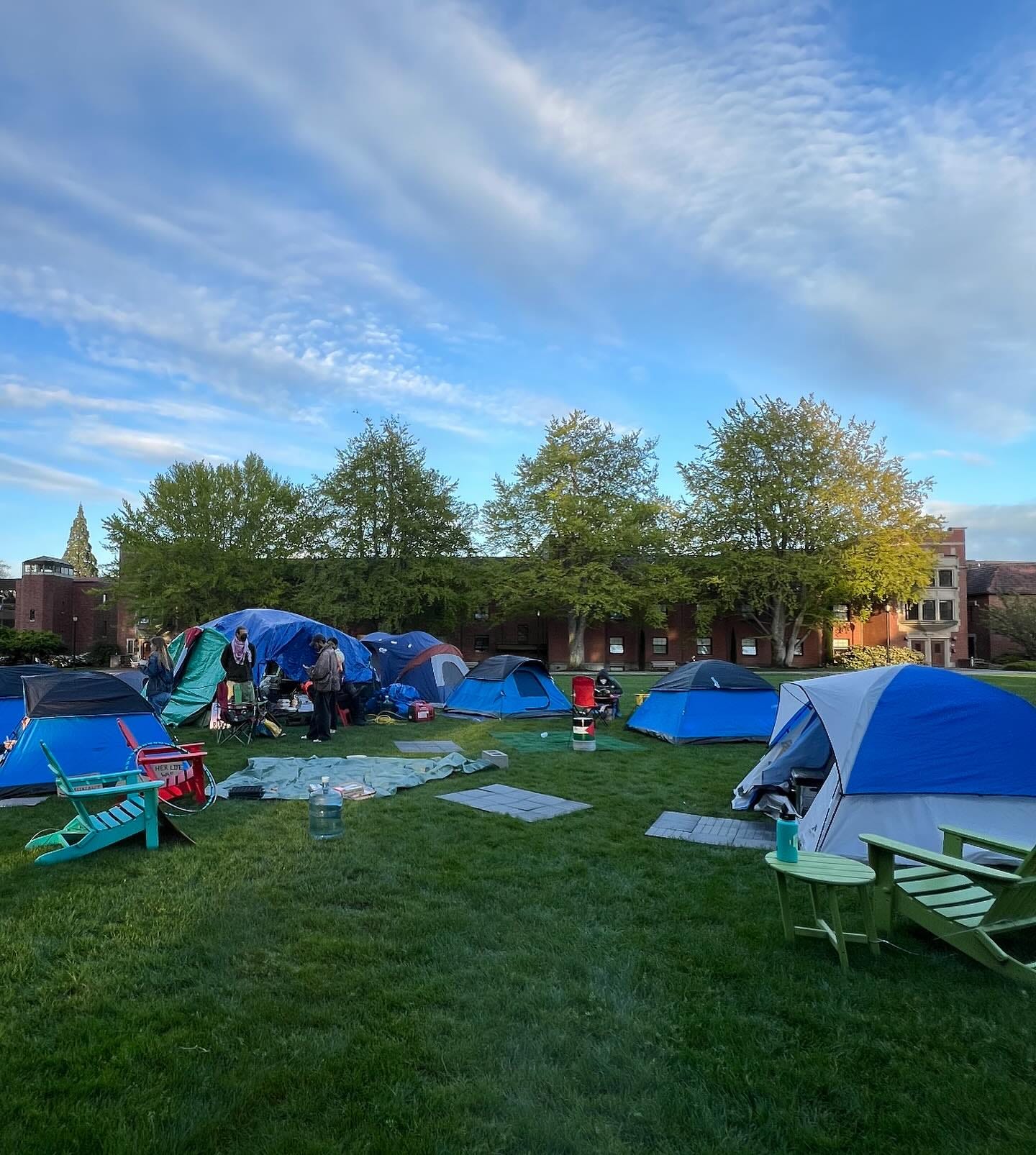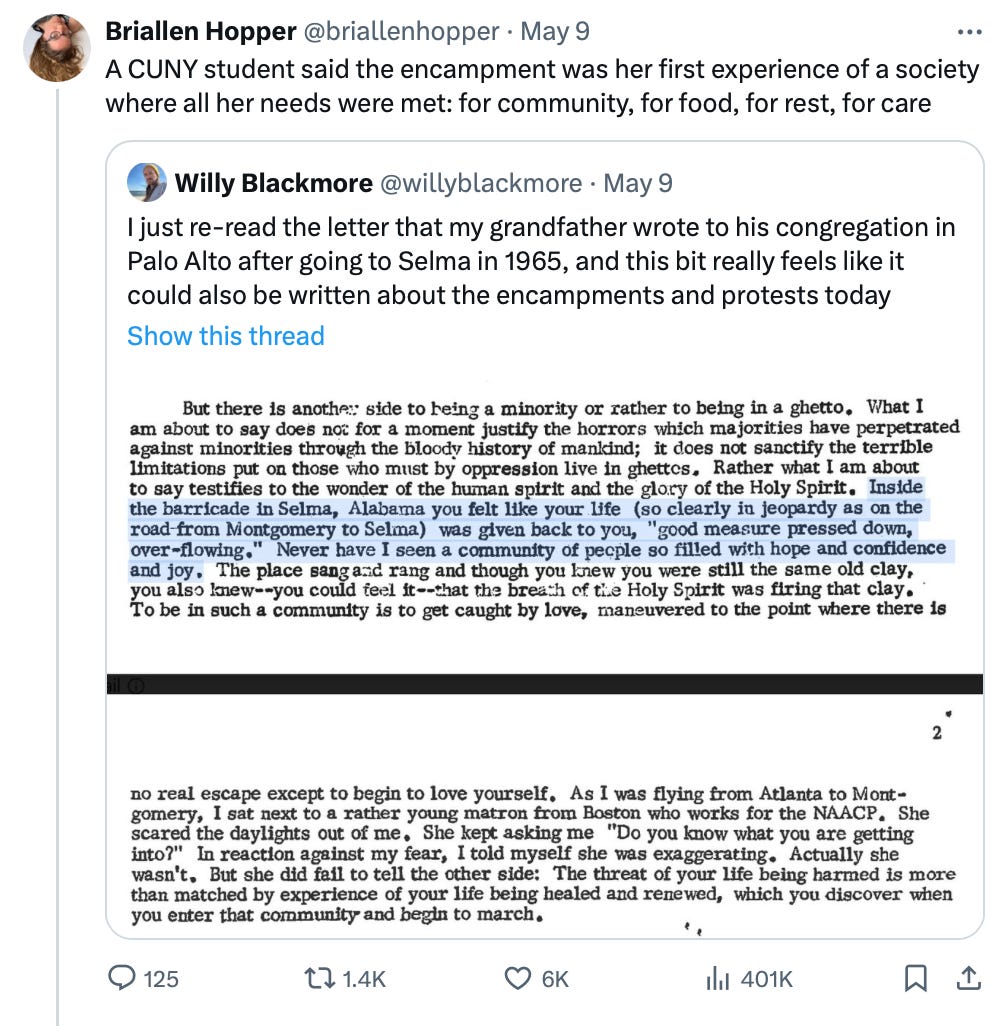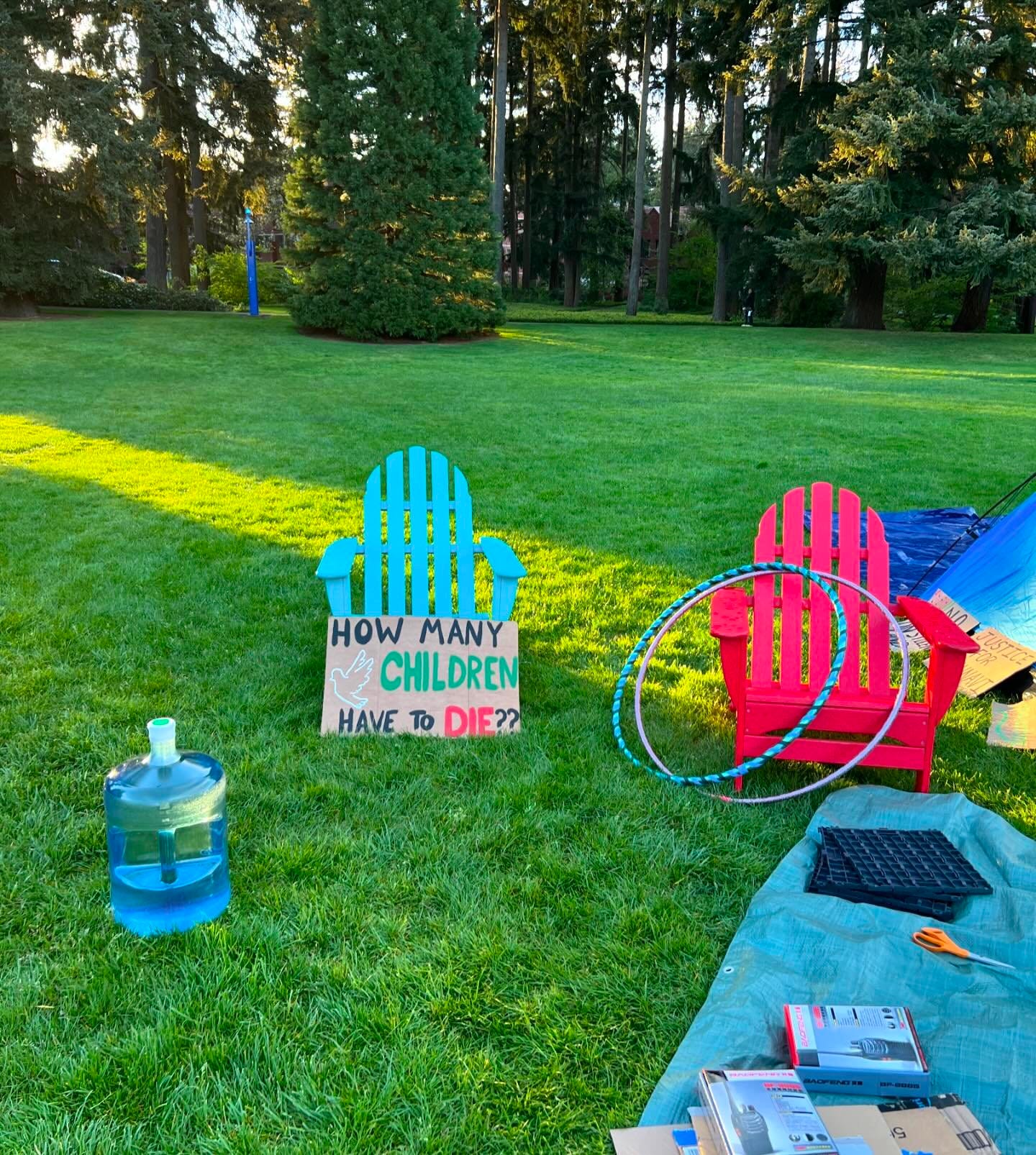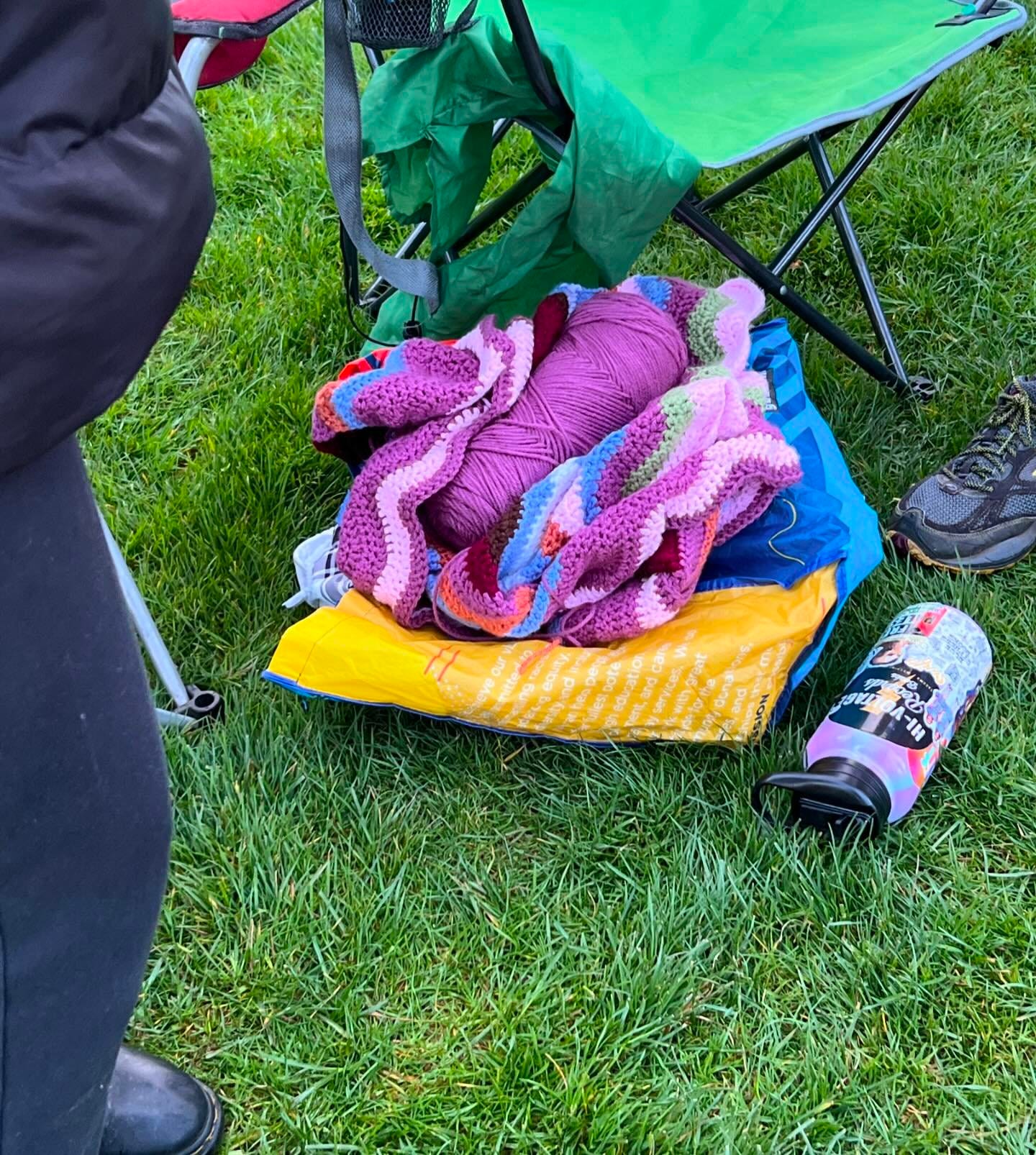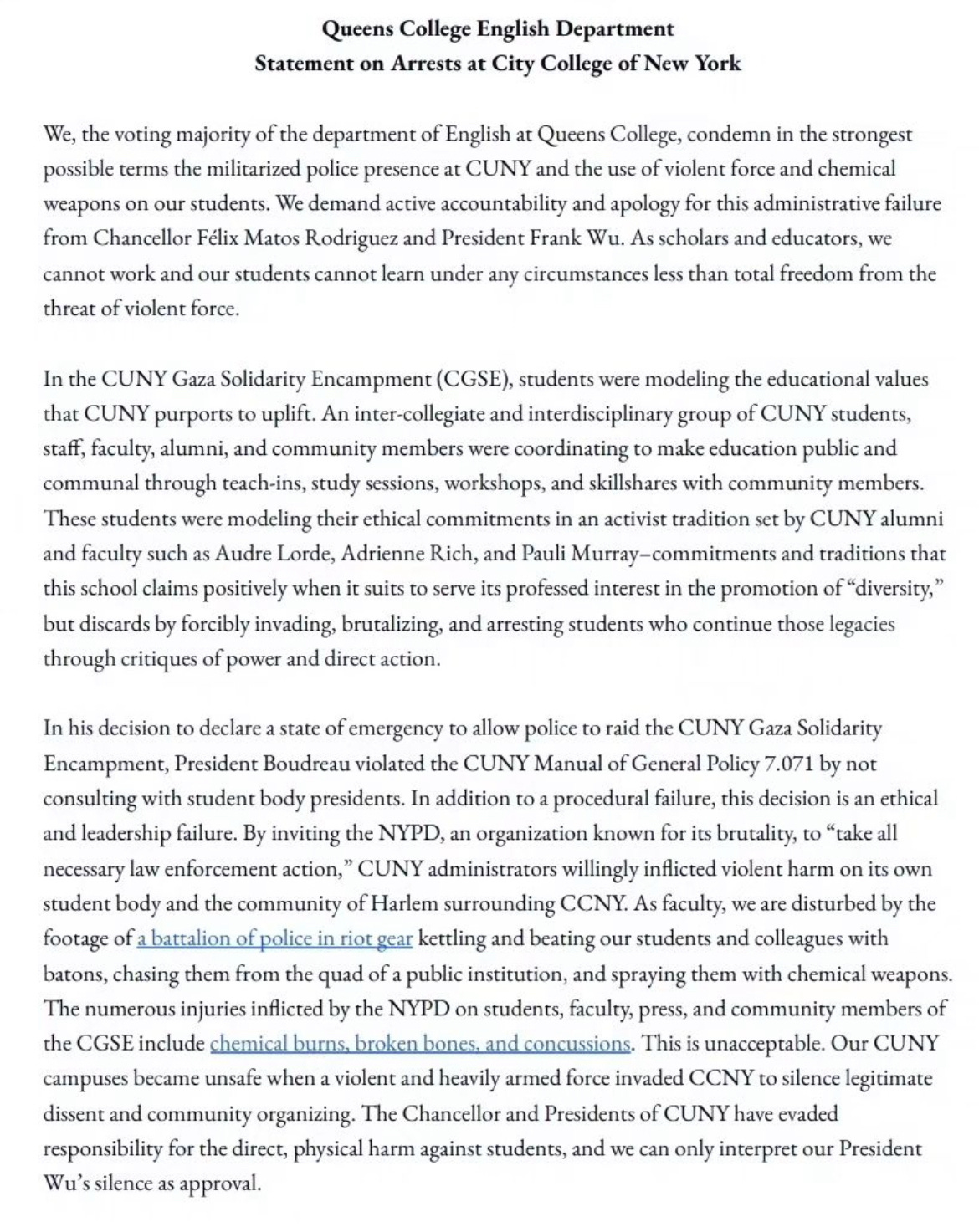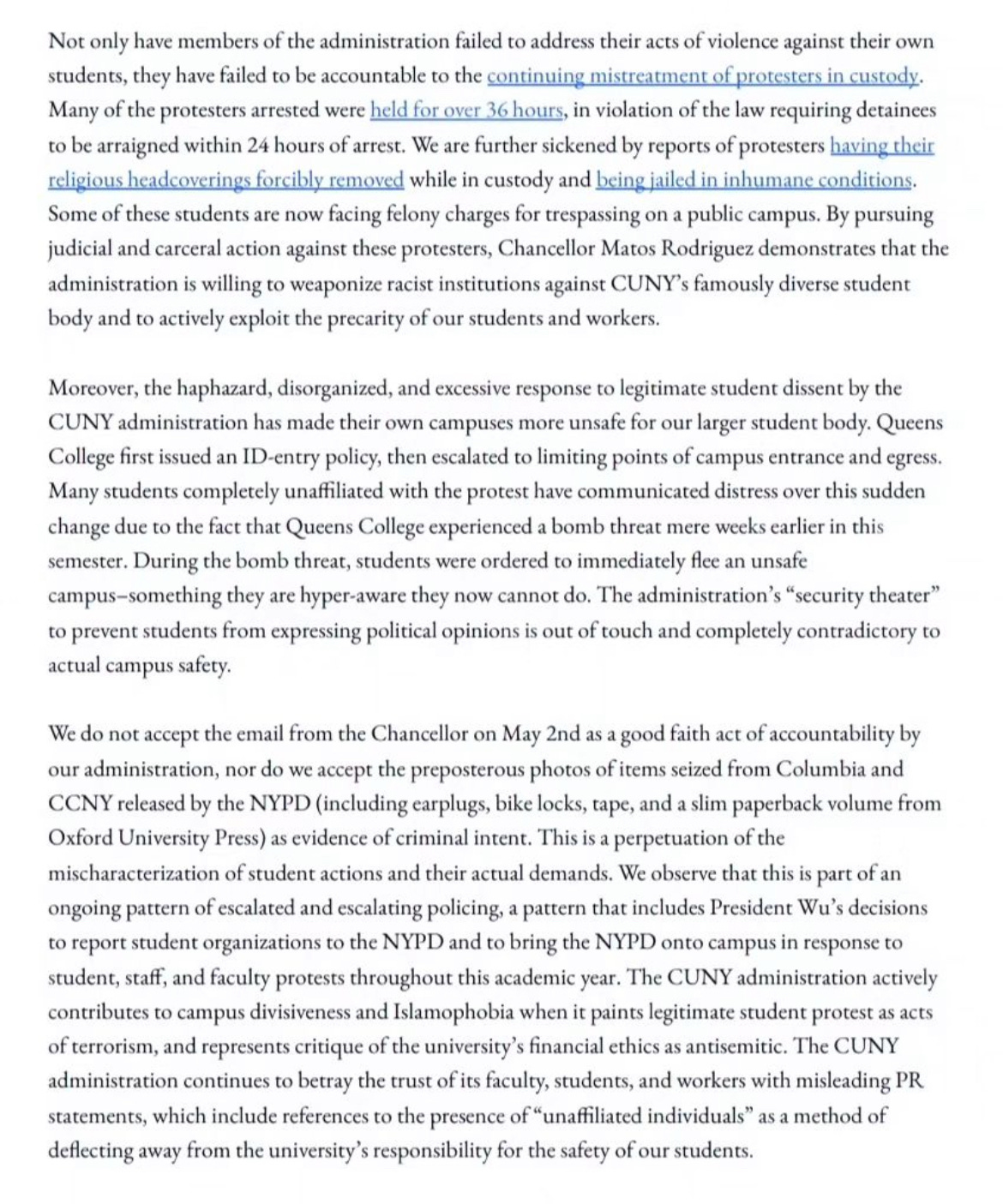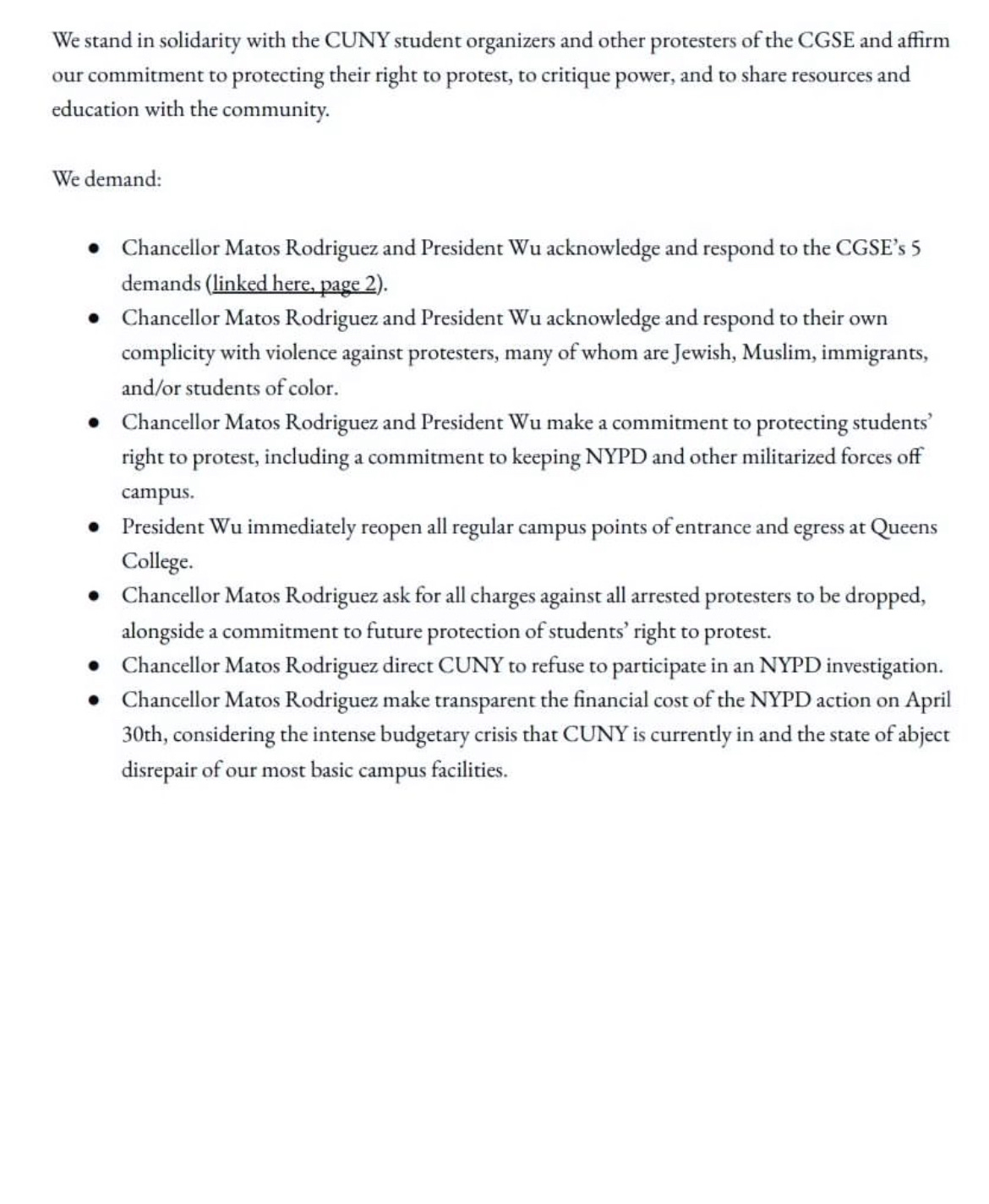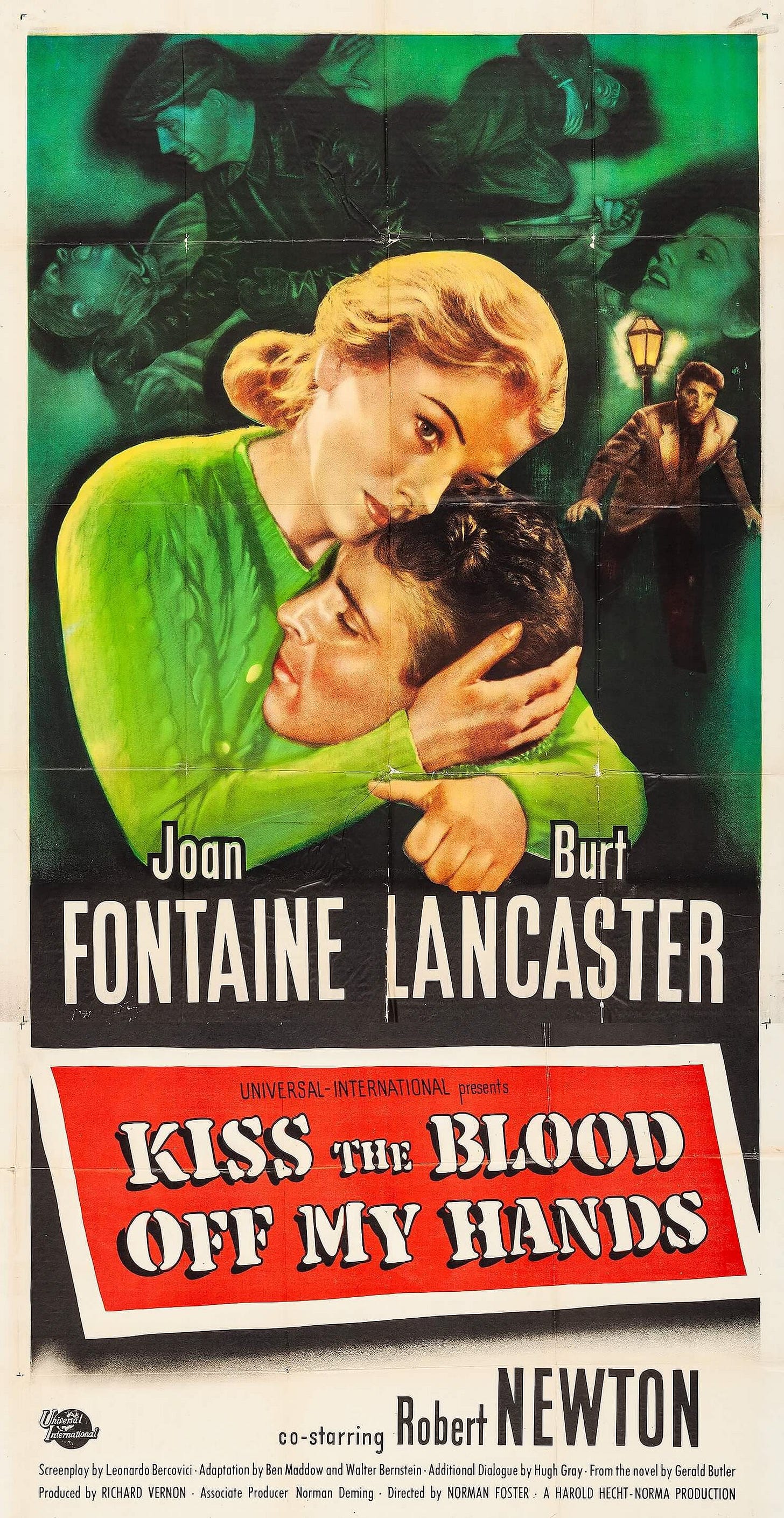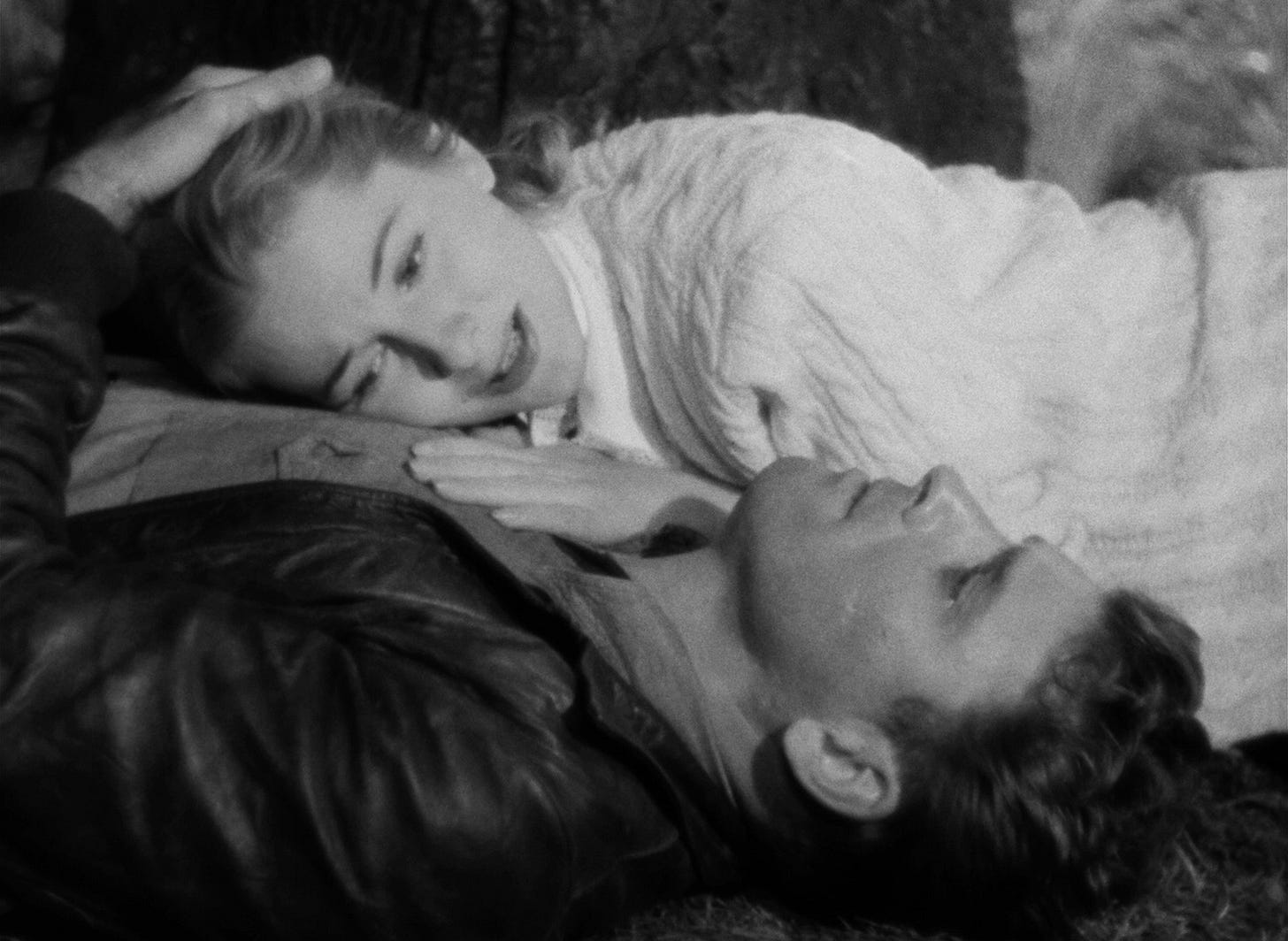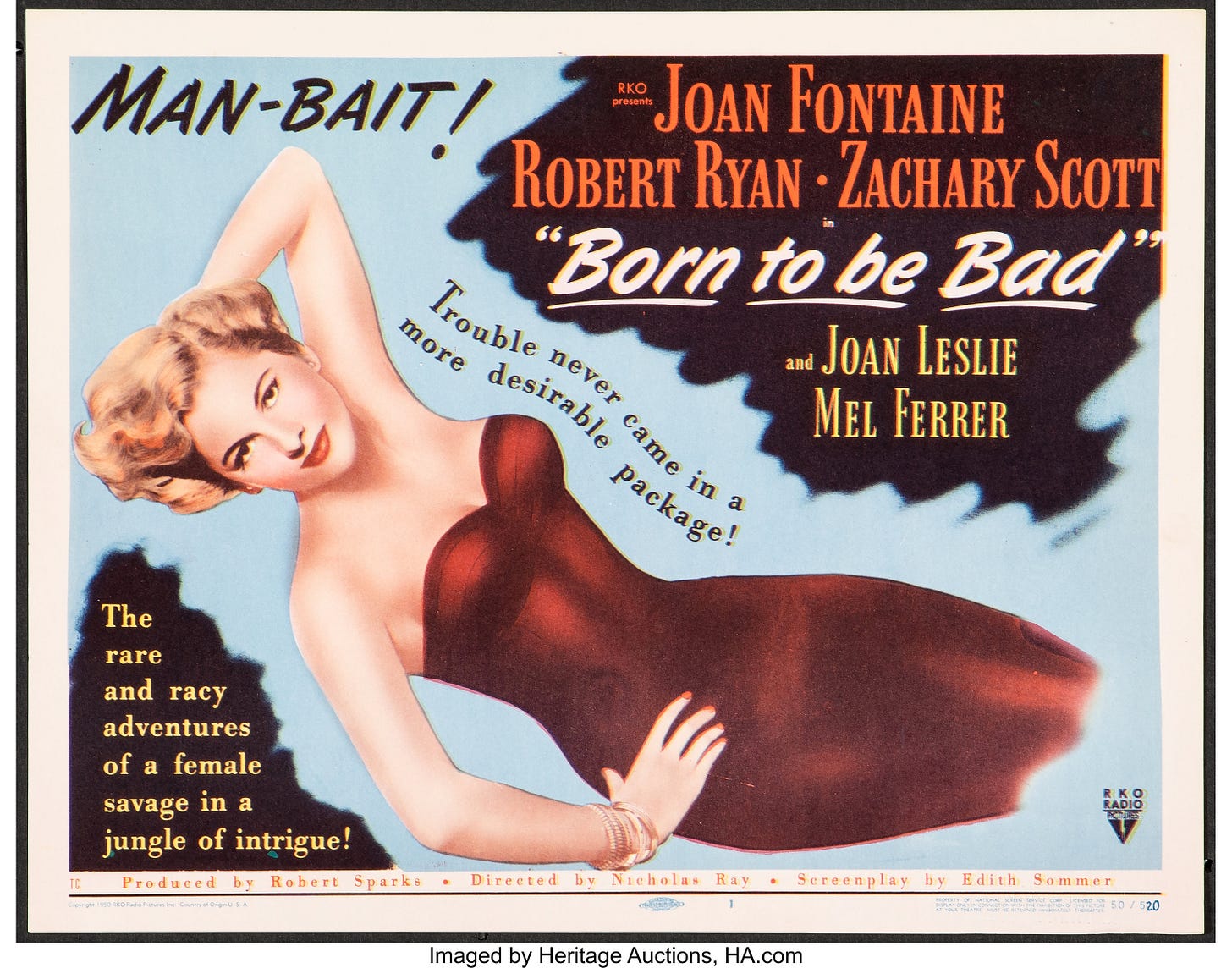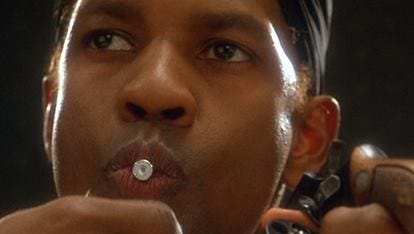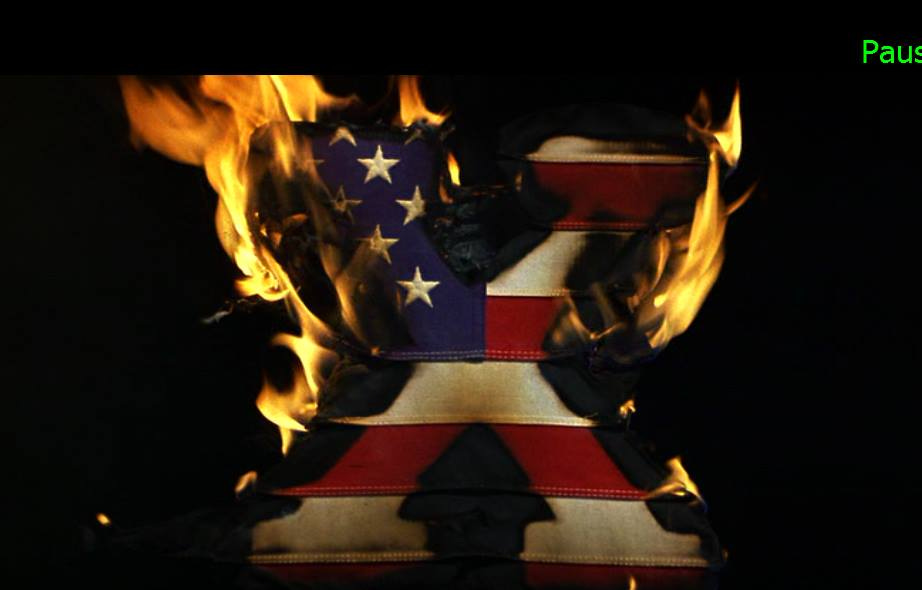Gaza Solidarity Encampment, the University of Puget Sound, April 2024
I was sad to miss CUNY’s Five Demands encampment—it began a few days after I left for a trip home to Tacoma, and was destroyed the day before I got back. But encampment is everywhere, so while I was away I stopped by the one at my alma mater with some food donations. They fed me vegan soup. It was beautiful, but within days it was gone.
When I was home I talked to my dad about his experiences as a 19-year-old war protester in the wake of Kent State. I knew he and his friends had shut down their campus, but I didn’t know that professors had failed the students who participated in the walkouts. My dad was put on academic probation and had to drop out. He eventually returned and got his degree, but the protests changed the entire trajectory of his life. He abandoned conventional middle-class ambitions, became a manual laborer, and devoted his life to God.
When people diss Boomers, I think about my parents’ idealism that honestly I will not ever fully live up to. It took them to some weird places sometimes, but they did teach me to mistrust the powers that be. They taught me that America was never truly our home.
Fifty-four years later, history is echoing itself. The fears I wrote about last month have all come true. There is a war being waged on campus protest, and Congress is trying to pass laws to make dissent illegal. The escalation has been extreme.
When Columbia first called in the police, I quit my little part-time job there in protest, alongside thousands of scholars around the world who joined an academic boycott. Within days, what should have remained a shocking aberration had become the new norm. Academic administrators have now sicced police on protesters at every school where I’ve been a student (Yale, Princeton, the University of Puget Sound) as well as at CUNY, where I work, and dozens of other campuses. Across the country, protesters have been pepper-sprayed, zip-tied, beaten, slammed skull-first onto concrete, and shot with rubber-coated bullets. Police have broken protesters’ ribs and hands, ripped off their kippahs and hijabs, and falsely charged them with crimes that may result in prison or deportation.
My brilliant colleagues Sawyer, Omari, and Chamara wrote a strong statement in response to the crackdown at City College. I’m proud of my department for somehow rising to the occasion and passing it.
What we’re facing on US campuses is nothing compared to the genocide in Gaza. But it’s the violence that makes that violence possible. And the chickens will continue to come home to roost. Democrats are celebrating the use of militarized force against their own children, from City Hall on up to the White House. Biden is funding 100,000 more cops. CUNY just announced it will be spending about $600,000 per week on contracts with private security companies while our university’s infrastructure continues to crumble. And soon Trump will take power and there will be no restraints at all. Bullets without the rubber coating.
Meanwhile, some escapism!
CRITICAL BITES
All I read this month was twitter. But I did watch some movies! I typed up some notes on a few of the best.
I’m kicking things off with a Joan Fontaine double-feature. You might know Joan as the quintessential innocent ingenue in Rebecca and Suspicion and The Women. This month I watched two films where she plays against type, a little or a lot.
Kiss the Blood Off My Hands (1948)
Hilariously, when I searched for this movie by saying “Kiss the Blood Off My Hands” to my Apple remote, Siri responded, “That’s not nice.” In fact, this film was so much better than nice, while being even more violent than it promised to be. It seemed to hold a key to love. And it was unpredictable at almost every turn. The ending genuinely surprised me, which is rare in a noir.
It begins with an extraordinary and timely epigraph:
The aftermath of war is rubble—
the rubble of cities and of men—
They are the casualties of a pitiless destruction.
The cities can be rebuilt, but the wounds of men, whether of mind or body, heal slowly.
Like The Best Years of Our Lives, Kiss the Blood centers on a romance between a self-possessed medical worker and a flailing veteran who has PTSD. But the plot is so much darker here—the world is more merciless, the undertow harder to resist. The film’s emotional range is strained almost to breaking between the lovers’ quiet moments of tenderness, some his and hers murder and manslaughter, and a graphic scene of flogging in a British prison—emotional and literal whiplash. Fontaine exudes characteristic vulnerability and uncharacteristic strength as a grieving woman who strays far outside her comfort zone in an attempt to find intimacy again. Like Peggy in The Best Years of Our Lives, she must learn to break the rules she’s been taught.
The penal code and the Hays code enforce simple ideas about good and evil, crime and punishment, but this movie does what it can to resist this reductiveness. People are not fully good or bad. Maybe they’re simply trying to survive. Kiss the Blood asks the question: What kind of future will the law and the genre allow damaged people to have? I was grateful for every shred of hope it allowed me to keep.
Born to Be Bad (1950)
Born to Be Bad is a fun Nicholas Ray version of All About Eve. (They came out the same year.) Fontaine plays against type somewhat less successfully here as an ingenue who’s not that innocent—the protegé making a play for her mentor’s man. Anne Baxter or Gene Tierney would have killed in this part—they do such thrilling chilling mask-off moments. Fontaine is predictably good at the baby-faced ingenue bit, but much less believable as a plotting scheming man-eater. Also (spoiler alert) she’s just a basic social climber, which is much more boring than being driven to evil by artistic ambition or excessive love! Nevertheless I enjoyed it, especially Robert Ryan and Mel Ferrer as 2 of the 3 men Joan is juggling. (Robert Ryan is worth reading about! His Wikipedia page made me want to read a whole 400-page bio with a bunch of glossy B&W pics in the middle.)
There are lots of little snappy bits in the script where a cliché gets flipped—if I watch it again someday (I likely won't, I'm getting old) I'll transcribe them. But here’s a fun moment: Robert Ryan, the bitterly ethical non-monogamist, responds to being propositioned by Joan the unhappily married woman: “Sorry, I’m not cut out to be a backstreet boy, and I don't make dates with other men’s wives unless they bring written permission from their husbands.” (But this is a Nicholas Ray movie, so he sleeps with her anyway.) I didn’t know till this moment what a “backstreet boy” was!
Spoiler alert: It has the best happy ending! She drives away with a backseat full of fur coats! It’s not a noir at all really.
Malcolm X (1992)
This one is obviously less escapist. Isaak had never seen it, so we watched it in sync on the plane to Tacoma. It’s rare that we both have three and a half hours to devote to a movie, where neither of us is multi-tasking or falling asleep. This is definitely a movie that deserves full-attention, single-screen viewing.
In lieu of freshly-written comments, I’ll paste in some of my lightly edited thoughts from the first time I saw it in 2015 at Yale, during another wave of campus protests:
I am NOT one of those people who think movies only count if they are on 35 mm and you see them in a theater on the big screen surrounded by people, but this movie could make me change my mind. I saw it surrounded by students and friends and it was like being in God’s house.
Other thoughts:
* This is a gangster movie. I didn’t see American Gangster but I don’t see how it could be more gangster than this.
* The opening with the Rodney King footage and filling a full screen with the American flag and then burning it down to an X: this is both the most 1992 part of the film, and the most 2015.
Bystander footage of police violence is the most important American film.
* I read The Autobiography of Malcolm X in an African American Autobiography class at Princeton and then again in an African American Spiritual Autobiography class (both taught by Al Raboteau of blessed memory, the first co-taught by Valerie Smith). As a former 19th century scholar, I love how perfectly Malcolm’s story sticks to the classical tropes of the genre: the Talking Book; Getting Saved; Getting Free.
And as someone who started out as a Frederick Douglass scholar, I especially love the double liberation plot (which is the plot of My Bondage and My Freedom): getting free from slavery or prison is not freedom just yet. Because you then have to get free of the people who were your first free community, who first asked you to speak to the public, because your brilliance is a threat to them, and they are not going to allow you to be the leader you are destined to be. International travel will help you to understand this.
Another Frederick Douglass trope: using idiotic white preachers as punchlines.
* Denzel is an actor and a movie star and he is also embodied charm, and that is so important because Malcolm was a mesmerizer. I was so dismissive of an article I wanted to like about male charm on film that mentioned Cary Grant and James Garner as charmers, with George Clooney as the lone living example. I’m sorry, but Mr. Clooney has nothing on Mr. Washington.
* Playing a convert means playing two people who are also one person, and Denzel is both Malcolm Little and Malcolm X and he makes the change real. It is risky bordering on funny to make a vision of Elijah Muhammed materialize in the cell, as Lee does. But when Malcolm finds himself able to pray, Denzel shows us conversion in the changing way he inhabits his body.
* Malcolm X & Ernie Chambers, both from Omaha.
* Dirty and clean water. Toilet bowl water. Ablutions. If I were an undergrad writing a close reading paper I would write about the water in the film.
* Wives in Malcolm X, Boycott, and Selma look beautiful and demure, and are terrorized by evil phone calls, and plead with their husband for safety and security, and want more from him than he can give, and survive the bombs in the night, and hold their babies close. [Isaak & I loved that Angela Bassett’s Betty is so much savvier and more cynical than Malcolm.]
* Spike Lee loves to make extended penultimate montages! I’m thinking of the one in Bamboozled, a long litany of blackface clips set to melancholy Blanchard brass. I like how the one in Malcolm X is a long litany of love in the form of actual footage of the real Malcolm edited to show his beauty, warmth, and wit. Both of these montages are about opening up extended space for feeling at almost the end of the film, but not quite at the end. I always want to do this too, right before the ending of essays: make an extended montage to make an emotional opening up. Mourning and love montages. I am not a Spike Lee of essays or anything, but I do make montages and I do like to put them in the same place!
* The film starts with America burning and ends with the world rising up, from South Central to South Africa.
CHALKDUSTED
I’m on the brink of my first summer off in as long as I can remember. I’ve been teaching some kind of summer school since 2005, and for the past five years I’ve taught twelve months a year. During the last calendar year I’ve taught at Queens College, CUNY Grad Center, Yale Summer School, and the Federal Correctional Institution in Danbury, in addition to reading a stack of theses for the Columbia MFA program and serving as assistant director of the Queens College MFA program. It’s nothing compared to the workload of many adjuncts, but it doesn’t leave much time to think!
I was able to finish my first book because I took half a summer off to go to a residency. I’ve started the last two teaching-intensive summers telling myself “finally I’ll finish my second book!” and I’ve forced myself to churn out stacks of pages, but there hasn’t been any time for new ideas to grow, for atmospheres to develop, for chapters to stretch and ripple and find their form. I’m hoping this summer I can get back to my brain.
This summer is a gift I wouldn’t have given myself because I didn’t think I could afford it. I’ve been trying to support myself in one of the most expensive cities in the world, and my last CUNY raise was less than one percent: effectively a pay cut. (I thought there might be some kind of real raise associated with tenure and promotion, or at least a cost of living raise. How wrong I was!) For years I’ve been sacrificing my writing time so I can do extra teaching so I can afford to live in the city where I do most of my teaching. It’s unsustainable, both because I really want to finish my book, and also because when I’m not writing I lose myself.
Luckily this week God showed up in the form of low enrollment and prompted Yale to cancel my summer class. There will be some belt-tightening (metaphorical only, I hasten to add!)—like the fam in Persuasion, I must retrench—but I’m going to grab this gift with both hands. On the agenda: reading and writing; a week of sister-and-aunt time in Maine; a week of friend-time in LA; lots of visits to Connecticut beloveds; all the NYC-in-the-summer concerts and movies in the park; and sauntering.
THE GOOD ENOUGH SAUNTER
For months I’ve been training in a half-assed way for The Great Saunter, an annual walk around the coastline of Manhattan which happened last weekend. But the day before the event, the friend who was going to fly from California to saunter with me had to cancel because of a family illness, and I decided that rather than walk alone I would wait till she could reschedule her visit and we could do our own 2-person pilgrimage along the route (maybe spreading it out over a leisurely long weekend).
A few days ago I ran into one of my students who had done the whole walk in the allotted twelve hours, and she was still limping. “I was sobbing for the last mile,” she said. “My friend and I were in so much pain we couldn’t even be happy we finished.” I felt simultaneously relieved to have escaped her fate and determined to do the whole thing in a day next year. I figure if I start actually training now, I might be able to make it.




